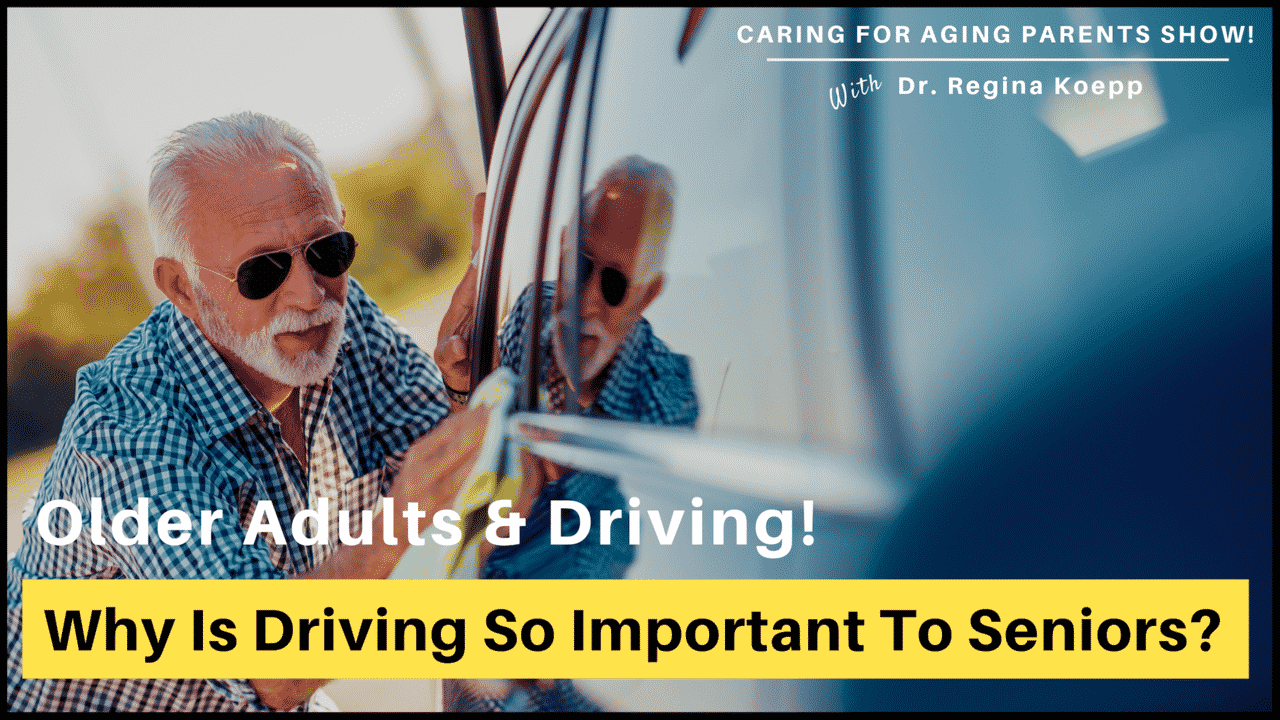Have you ever wondered about why driving is such a big deal to older adults?
Well, today I’m gonna answer the age old question (see what I did there) about why driving is such a big deal to older adults. Buckle up!
If we’re gonna talk about older adults and driving. We have to talk about an idea that many people have that older adults are bad drivers.
This is a myth, which has been formed by ageism.
What is Ageism?
Ageism is bias and discrimination based on age. And, it harms older adults!
Ageism affects older adults at almost every level of their lives. For example, it plays a major role in older adults not receiving adequate health care (“of course you have that condition… you’re old”), in losing opportunities to stay in the workforce (“don’t you think you should retire?“), and even in beliefs that older adults are bad drivers.
Let me give you an example:
You hear a story on the news about an older adult who made a mistake while driving (like maybe they were driving the wrong way on a one-way road) and you shake your head and say to yourself, “older adults should be required to stop driving at a certain age”
We’re all at risk of having this response, but this idea is based out of bias (ageism) rather than on facts. These types of news stories confirm our bias that older adults are BAD drivers. When in fact…
Research shows that older drivers…
are actually some of the safest drivers on the road.
So, How are Older Adults Driving?
Let me start out by saying that there are more than 40 million older adults (people 65 and older) who have an active driver’s license. You may be surprised to hear that they are, by and large, very safe drivers.
In fact, they’re more likely to wear their seat belt and drive the speed limit and are less likely to drink and drive than any other age group.
According to the National Highway Traffic Safety Administration (NHTSA), older adults are less likely to be the drivers involved in fatal car accidents than people younger than them. As might expect, people ages 16-24 were the most likely to be driving.
But, even though older adults are the least likely to be drivers in car accidents, sadly, they are more likely to be injured or killed when they’re in a car accident because of age-related vulnerabilities, like more fragile bones. Or, because they have medical conditions like heart disease, diabetes, or other illnesses that make it harder for them to recover from major injuries.
Not all hope is lost, next week’s blog will have 5 tips for keeping your aging parent driving safely for as long as possible.
I imagine you’re wondering…
What about the body’s natural decline with aging? Aren’t older adults more likely to be on medication? Don’t these affect a person’s ability to drive?
Yes, as we age our bodies naturally experience physical changes like to our vision, hearing, mobility, reaction time, mild memory changes, and so on. Our bodies are also more vulnerable to medical conditions, which might impair our ability to drive or require medications that can affect driving.
Even when there are medical changes and new medications, researchers have found, however, that older drivers are more likely to adjust their driving habits to accommodate these changes by driving in familiar areas, on surface streets (not on the freeway), during daylight hours, and they tend not to drive just after they have taken medications.
Seems like some of us younger drivers could take a lesson from the older ones!
Now, back to the question:
Why is Driving So Important to Older Adults?
I’ve heard many middle aged people say, “why is driving such a big deal to older adults? I’d love to be driven around by somebody else.”
The answer is pretty simple!
Driving helps older adults stay independent later in life. It allows them to go to their doctors’ appointments, participate in activities that they enjoy, go to the grocery store, visit family, AND helps them maintain morale and a sense of self-confidence.
Without access to transportation, older adults are at risk of isolation, which puts them at risk for depression. The AAA Foundation found that when older adults stopped driving, they tended to stay in their homes, their social network shrank, and their… Risk for depression nearly doubled!
Not to mention that they were also more likely to experience cognitive decline and be admitted to a long-term care facility.
So, you can see just how big of a deal driving is! Who wants to lose friends, become depressed, and move into a nursing home? Not me! And, my guess is that you don’t want that for yourselves or your aging parents either.
It’s no wonder that there’s a BIG incentive to remain driving as long as possible!
Now, let’s return to the example of the older adult on the news going the wrong way down a one-way road. So, instead of thinking that all older adults should stop driving at a specific age, we should be thinking:
- How do we help our aging parents drive safely for as long as possible?
- How can we help our aging parents gain awareness of their own personal warning signs for modifying or cutting back on driving?
- How can we help aging parents come up with a driving retirement plan? So that they can prepare emotionally and financially for stopping driving?
I’ll be talking about each of these questions in future blogs.
And, of course there may come a stressful time that you have to talk with your aging parents about stopping driving when they are no longer safe to drive and not stopping on their own. I’ll be talking about this in future posts/episodes, too!
Until then, here is a free, Caring for Aging Parents Roadmap to Safe Driving to get you started!
Lots of love to you and your family,
Dr. Regina Koepp
PS: Join me next week, when I’ll be sharing 5 tips to help you keep your aging parents driving safely for as long as possible!
References:
Check out these related episodes:
Check out these related episodes:
- Older Adults and Driving! Why is Driving So Important to Seniors (Ep #013)
- Safe Driving Recommendations for Older Adults! 5 Tips (Ep #014)
- Is My Aging Parent Safe To Drive? 10 Driving Warning Signs (Ep #015)
- Helping Aging Parents Plan for Driving Retirement! (Ep #016)
- How To Find Transportation For Seniors! 7 Strategies! (Ep #017)
- Helping Older Adults Try Out Transportation! 5 Tips! (Ep#018)
- Talking With Older Adults About Stopping Driving Without Pushing Them Away! (Ep #019)




